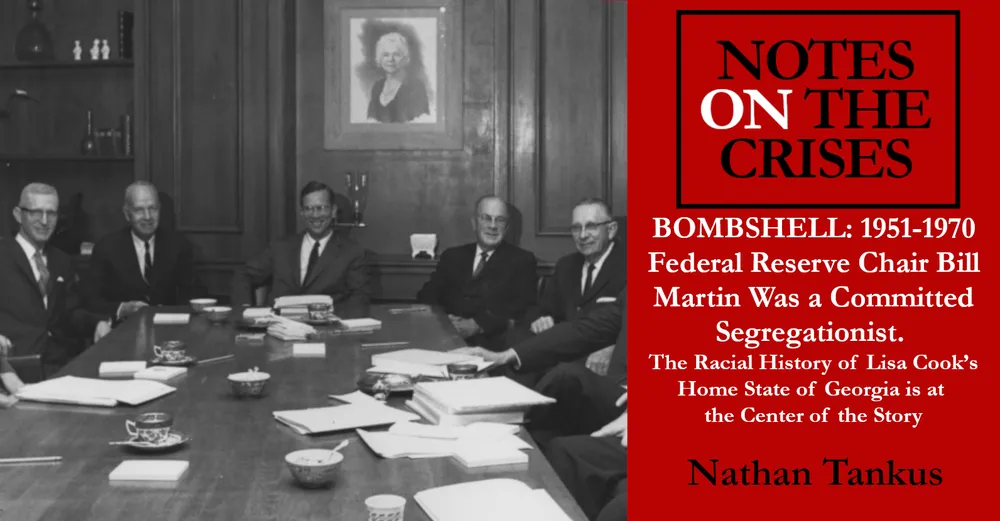BOMBSHELL: 1951-1970 Federal Reserve Chair Bill Martin Was a Committed Segregationist

This is a Premium piece of Notes on the Crises.
Federal Reserve governor Lisa Cook was born and raised in Milledgeville Georgia, about a 100 miles away from Atlanta. She also shares a birth year with the Civil Rights Act of 1964 which, among other things, gave the federal government multiple tools to enforce the desegregation of public schools- including the denial of federal financial assistance. This is often referred to as “banning” racial segregation in public schools but Lisa Cook can attest to the fact that racial segregation and discrimination in Milledgeville Georgia’s public schools was alive and well during her early life, this legislation notwithstanding. The most dramatic anecdote in the public record about her experience at that time illustrates the messy reality:
Yeah. I mean, I was desegregating schools along with my sisters, and I was beaten - you know, I was beaten up. I still have scars from that - scar where hair won't grow in my eyebrow and a scar on my leg from having been beaten during that period, during the period of desegregation.
The public record attests to the slow and painful difficulties involved in pursuing desegregation in Baldwin county, Georgia-the county Milledgeville is located in.
In a report submitted to a senate committee on “equal education opportunity” in 1971, the experience of Baldwin county’s school system is briefly brought to light:
Baldwin County , one of the few counties that flagrantly refused to pay Negro teachers the same local salary supplement as that paid white teachers , has displaced one of its Negro principals. This position is slated to be filled by a white person . Some Negro pupils attended several schools built for all white pupils . Some white teachers taught in schools where there were only Negro pupils but no Negro teachers taught in schools where there were Negro and white pupils , except for some classes held at the Milldegeville State Hospital . A Negro principalship as of this moment has been lost to a white person in Baldwin County
While this report is focused on the experience of teachers and principals, it shouldn’t surprise readers that these conditions extended to students as well.

We don’t, however, have to rely on supposition. 15 years after Rosa Parks refused to give up her seat in Birmingham Alabama, and less than a four hours drive away, the Milledgeville community had to fight to get school buses desegregated. A section of the Department of Justice created by the Civil Rights Act of 1964, the “Community Relations Service”, has the story:
In mid-September, CRS received complaints from black students and parents indicating that they were being forced to sit in specific seats on the school bus and had to give up their seats when the white seating section was filled. Tensions stemming from this situation grew in late September when 15 black students were forcibly ejected from the bus by the county sheriff, two deputies, and the driver for refusing to sit in the first six seats as directed. The black community became more irate as their attempts to have local school authorities cease this practice were rebuffed. Further frustrations developed when Federal authorities failed to respond to their requests for relief. Communications between school authorities and the community broke down completely when a small number of black students began boycotting the schools.
On September 28, an overflow crowd from the black community attended a mass meeting to discuss local school problems, particularly the school busing situation. Black leaders counseled the group to begin mass demonstrations, picket- ing, and protest marches for the following week, in the event the school problems were not re- solved immediately. On September 30, CRS arranged a meeting between the Baldwin County School District authorities and the black leaders. During this lengthy meeting agreements, concessions, and compromises were effected to rectify the problems. Most of the concessions related to black representation on the school board, school advisory committees, and busing policies. Nevertheless, mass demonstrations, picketing, and possible violence were averted.
This is the environment Dr. Cook grew up in and it left both literal and figurative scars.
The Civil Rights of 1964 profoundly impacted the trajectory of Governor Cook’s life. The desegregation she was at the forefront of did create educational opportunities that she took full advantage of- as she herself recounted in a 2024 commencement speech at Milledgeville’s own Georgia College & State University. Her mother Mary Cook was GCSU’s “first tenured African American faculty member”. Something else, someone else also had a profound impact on Lisa Cook’s life. His name was John Sibley and he was also born and raised in Milledgeville Georgia- though 76 years before Lisa Cook.
John Sibley’s connection to the Federal Reserve Board does not, however, start and end with sharing a birthplace with Federal Reserve Governor Cook. Another Federal Reserve Governor was a major part of John Sibley’s life. In fact, it was a chairman he knew. Not just a Federal Reserve Chairman; the Federal Reserve chairman who defined the meaning of “Federal Reserve Independence”- William McChesney Martin Jr. His nearly 19 year chairmanship started nearly five years before the Montgomery Bus Boycott and ended almost two years after Martin Luther King Jr.’s assassination. His segregationist commitments thus define what the ideology of Federal Reserve independence has meant in practice.
First though, we need to understand who John Sibley was, why he was so important to Georgia history and what connected him to the Fed’s Bill Martin. Understanding this story involves getting a handle on the complex web of relationships between Georgia industry, Georgia politics and Georgia educational institutions. Where should we start to unravel this web? The Coca-Cola Company naturally.
Sign up for Notes on the Crises
Currently: Comprehensive coverage of the Trump-Musk Payments Crisis of 2025
